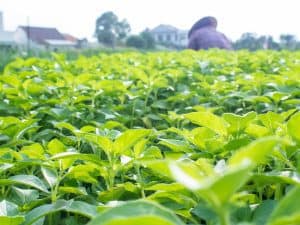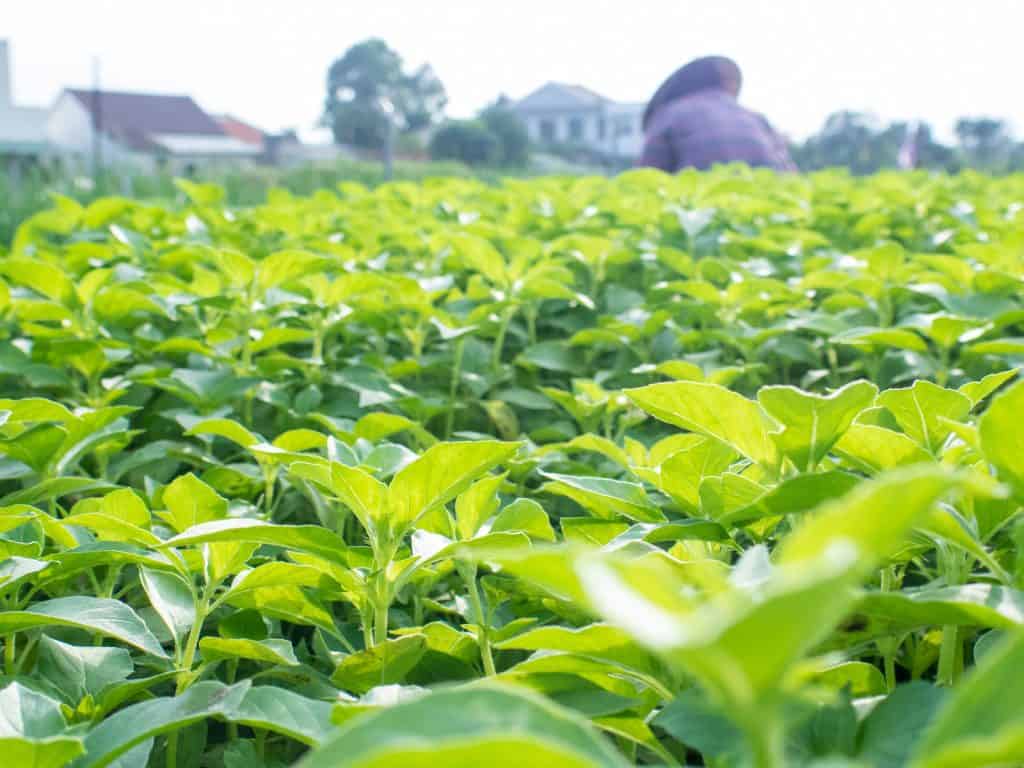An important part of all my travels is local food. I always venture out in search of street food and local specialties. So when I was asked to join a brand new Hoi An food tour, it didn’t take much to convince me.
Bike and Bites is a brainchild of Thin, the owner of Hoi An Cycling and possibly the best coffee shop in Hoi An, Phin Coffee. While you can book many cooking classes and a few foodie tours in town, this is the first tour that aims to connect Hoi An’s unique history, the flavors, and the creative process behind the delicacies. And since you move from eatery to manufacturing place to eatery, etc. by bike you’ll even get to work off some of the calories consumed.
All the food below is included in the tour price; you just bring curiosity, elastic pants, your camera, and sunscreen.
After everyone has picked their bikes and the helmets, and the saddles are adjusted to make for a comfortable day, we leave the bike shop and turn towards the cathedral. There, on the street shaded with big trees, an old lady was stirring a black soup in a big aluminum pot. We sit down on the tiny chairs and learned that this is a very special version of sweet soup (Che), a mainstay of Southeast Asian street food. Ximaho is made from sesame and served in small porcelain bowls. I eagerly finish till the last drop, we check our faces for any traces of the black concoction and get back on the bikes.
The next stop is for Banh Mi. Let me be honest: I am not a fan of Banh Mi. I mean, it’s a friggin sandwich! But for most people, a visit to Vietnam isn’t complete without this short paté-filled baguette. And Madam Khanh’s Banh Mi is definitely one of the better samples I’ve encountered in the country.
The next stop is another uniquely Hoi An dish: White Rose (Bong Hong Trang). In the eponymous restaurant, which as we learn supplies all other places in Hoi An serving White Rose, we gather around a large table. About a half a dozen women are chatting while their hands automatically fulfill their respective tasks: Some are tearing small portions of a big slab of white dough and roll them into balls of uniform size; others are taking these balls and flatten them with their thumbs to perfect white disks, while the remaining ladies fill the white disks with different mixtures of ground shrimp and meat. The result is a cute, flower-shaped dumpling. It looks effortless but when we try even working at snail speed doesn’t produce anything as elegant as the ladies churn out at breathtaking speed.
While we are not going to do any cooking ourselves today, we still head over to the local market a little outside the touristic center of Hoi An Old Town. On the outskirts, we sit down for a sugarcane juice. I’ve said it before, and I am happy to repeat as often as anyone will listen: I think that sugarcane juice is the most refreshing drink ever created. To get even more refreshment out of it, the juice here is made from sugarcane squashed with a cumquat and served with a pinch of salt to help refill the electrolytes you might lose on a sweaty day.
In a small side street, we sit down in what looks like somebody’s front room. We learn that the family opens their house every afternoon to sell Banh Beo, a steamed rice cake served once again in tiny porcelain bowls with a type of cocktail sauce, crunchy noodles, and chili added to taste.
The next stop on our Hoi An food tour is the Cao Lao noodle manufacturer on the edge of town. Cao Lao is another city-own specialty: the noodle dough is enriched with ashes from trees grown on Cham Island off the Hoi An coast and made with water from a specific well in town. You definitely cannot get authentic Cao Lao anywhere else in the World. Unfortunately, today the workshop is shut because the owner is renovating his small house and there is a giant crater in his front yard.
So we move even further out of town, passing rice fields, and water buffalos seeking reprieve from the heat in muddy channels and water holes, to Tra Que, the “Herb Village.” Along fields of herbs, vegetables, and even flowers, farmers – or shall I say “gardeners” – are tending to their crop, plucking weed, cutting salads, carrying buckets of water. We linger for a while to take pictures and then settle down in a restaurant on the edge of the fields. We have the special house drink – a slightly salty cumquat juice – and Tra Que village’s signature dish: Three Friends (Tam Huu), a simple mix of pork, shrimp and spring onion.
Our tummies pleasantly full with all the bites we’ve tasted today, we make one last stop right in the heart of Hoi An Old Town: At Phin Coffee, we are treated not only to a refreshing iced coffee, but we also learn where the Vietnamese coffee tradition originated, where it stands today, and how traditional Vietnamese Phin coffee is made.
If you like food and photography, then this Hoi An food tour is made for you as it offers many bites and flavors along with postcard (or Instagram) perfect motifs in and around the city. Plus, all the guides spoke perfect English, which made it easy also finally get answers to some of my other Vietnamese food questions (like: What’s up with all the noodles? And what does Banh, a word that seems to be part of any Vietnamese dish, mean?).
Note: As I participated in the test runs and Thinh was still trying to narrow down all the endless possibilities Hoi An cuisine has to offer, your tour might be slightly different from mine. You’d best contact him via the Hoi An Cycling website or find him at Phin Coffee.
Hoi An food tour pictures

Affiliate & sponsorship disclaimer: All opinions expressed in this post are 100% my own. I did not receive any payments, discounts, or freebies from the businesses mentioned in this post in exchange for a mention. I am, however, member of the Booking.com, Baulao.com, and Get Your Guide affiliate programs; this means I will receive a commission for any completed sale on those sites if buy something after entering those sites coming from my website.

